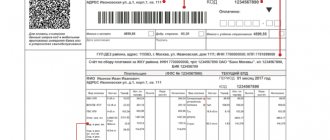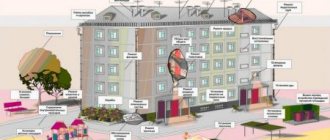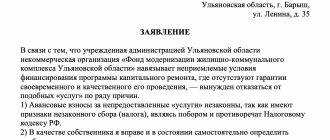In accordance with Art. 153 of the Housing Code of the Russian Federation, the obligation to pay utility bills rests with the owner of the residential premises. He is obliged to make regular payments in accordance with the agreement with the management company, HOA or directly with the service provider.
Payment for heating is calculated regardless of whether anyone lives in the apartment or not. Other utilities (electricity, gas, water supply, sewerage) are paid in accordance with meter readings, if installed, or according to the tariff.
If the house cannot be equipped with meters, then payment is calculated according to the standards. If the owner does not live in the apartment, he can provide a certificate about this to receive a recalculation.
Thus, utility bills can be charged even if no one lives in the apartment. Therefore, the owner is obliged to constantly make payments.
If funds are not paid on time, a debt is formed.
Important! It is advisable to prevent the formation of debt. If the amount of rent is prohibitively high for the family budget, it is necessary to take care in advance of obtaining assistance from the state to pay for them.
Only owners who do not have payment debts at the time of appeal are entitled to assistance.
If the debt has already been accrued, then it is necessary to develop a repayment procedure.
In 2021, there are several ways to pay off utility debt.
No.
| Repayment methods | |
| 1 | Debt restructuring |
| 2 | Government subsidy |
| 3 | Benefits for certain categories of citizens |
Sanctions: what can happen
It is advisable to pay for consumed resources, as well as other services provided as part of the maintenance of multi-apartment residential buildings, in a timely manner, otherwise you can safely prepare for various troubles. These include the accrual of penalties for non-payment, shutdown of resources (electricity, hot water supply)
, as well as to the appearance of statements of claim sent to the judicial authorities in order to collect the debt owner.
The right for public utilities to apply such sanctions is prescribed in the legislation; for more detailed information, it is worth studying Article 14 of the Housing Code of the Russian Federation.
The initiators of these troubles can be both management companies, which automatically incur debts to resource suppliers, and the resource suppliers themselves, if the owners interact with these organizations directly (or through the HOA)
Accordingly, if the court makes a decision in favor of the plaintiff, the debt collection procedure begins. This is done by bailiffs, who legally have the right not to limit themselves to reminders or verbal demands, but can also seize any valuables from the apartment for subsequent sale in order to pay off the debt. Well, and, of course, in some cases, a sanction such as eviction from an apartment is used, which will be sold, and the funds will be used to pay off debts.
We don’t pay for two or three months: there are no critical consequences
If payment of utility bills is delayed by more than one month, the management company will begin to charge a penalty (for the unpaid amount)
. Thus, the penalty is charged from the second month of delay, and not from the first, which means that the owner can actually postpone payment for a month without any consequences for his budget. However, sometimes there are cases when, for some reason, it is more profitable to pay everything off after a while, including penalties, than to pay bills regularly.
Therefore, you need to understand the mechanism for calculating this penalty and its possible sizes. The penalty is calculated for each day of delay and is tied to the current refinancing rate (the rate at which the Central Bank lends to other banks)
. In addition, the percentage of penalties depends on the length of delay in payment:
- From the second month to the third the penalty is 1/300 of the rate;
- Starting from the fourth month and subsequent months - 1/150 of the rate (that is, you will have to pay twice as much)
.
Speaking in numbers, we can give the following example:
If the debt amount is 2500 rubles, which remained for 10 days, you will have to pay 1/300 of the rate, which today is 7.5%. That is, through simple mathematical calculations we get: (2500 rubles * 10 days / 300) * 7.5% = 6.25 rubles .
For the first month of delay you will have to pay about 20 rubles, for the second – about 40 rubles.
Thus, these sanctions, taking into account the very democratic amounts of fine payments and their ratio to the principal amount of the debt, can be easily survived. The only thing is that it is undesirable to get carried away too much, since the amount of the principal debt may accumulate, which will be unaffordable for a one-time payment.
In this case, you will have to restructure the debt, and at the same time pay current bills that no one has canceled.
We haven’t paid for three to six months: the situation is heating up
So, three months is the delay that utility companies give before resorting to more serious sanctions.
Namely: after three months of non-payment, the question of temporarily disconnecting the apartment from utilities may be raised.
This unpleasant procedure is quite well established today - after sending a notification (possibly either personal receipt or mailing),
three days later one or more services are disconnected. After payment of the debt, services are connected within a few days.
It is worth saying that this measure is practiced much less frequently than today there are owners who have problems with utility debts for more than three months. In addition, this can only happen if the owner completely ignores the need to make payments.
If some money (part of the amount of payments or debt) is paid quite regularly, utility companies do not dare to take such measures. Most often, disconnection is practiced when the debt period has reached (or exceeded) one year.
We haven’t paid for more than six months: is it possible to lose our housing?
Now about the last resort - the eviction of the defaulter from the apartment for the sale of real estate in order to pay off debts to utility services.
Many people think that this measure is directly dependent on the accumulated debt or the period of non-payment. In fact, the management company can initiate eviction after six months of non-payment.
However, in reality, eviction is practiced extremely rarely due to the huge number of technical difficulties in implementing this measure, and utility workers know this well. It is much easier for them to shift the burden of debt collection to bailiffs or simply sell the debt to collectors.
Actually, those who are more or less realistic to evict are those who live in the apartment under a social tenancy agreement. It is technically possible to take an apartment away from the owner, but there are a number of restrictions:
- You cannot evict minors (and, accordingly, parents)
; - You cannot take away an apartment if it is the only housing that is owned by the resident.
- And most importantly: you cannot even begin the eviction procedure (at least the courts do not make such a decision)
if payments were made, even partially, during the specified period.
Moreover, in 2021 there are amendments to the law that define additional restrictions on the possibility of eviction. Namely, valid reasons were approved, which were an obstacle to regular payments, these are:
- Difficult financial situation;
- Dismissal from the workplace;
- Serious illness of the employer or a member of his family;
- Disability of the employer or members of his family;
- There were funeral expenses;
- Presence of minor children in the employer's family.
Thus, with minimal knowledge of the law, a defaulter can find a way to reserve the right and opportunity to dispose of residential real estate. This means that legislators, in fact, provided for the impossibility of mass deprivation of apartments from citizens of the Russian Federation in the context of the difficult economic situation in the country.
Legislation
The obligation to make monthly payments for housing and communal services is fixed in Article 155 of the Housing Code of the Russian Federation dated December 29, 2004 No. 188-FZ. According to the law, the owner must transfer funds to the management company’s account no later than 10 days after the end of the month following the billing period.
Payment may be made later if the condition is specified in the agreement between the service provider and the apartment building. The decision to postpone the repayment of debt for housing and communal services can be made at a general meeting of residents.
Attention! According to Art. 155 of the Housing Code of the Russian Federation, payment after the specified period is considered a violation of the agreement between the tenant and the management organization. But liability for non-payment occurs if contributions are delayed by 31 days or more.
Is it possible not to pay debts? Debtor's life
However, does this mean that the defaulter has the opportunity, on completely legal grounds, to continue to live and not pay utility bills?
Actually this is not true.
- First, once you accumulate a certain amount of debt, you can say goodbye to the idea that you own your home. The apartment will be seized, and no legal transactions can be carried out with it until the debt is fully repaid, which is especially important - it cannot be passed on by inheritance. After the death of each owner, his share becomes the property of the organization in whose favor the encumbrance (seizure)
.
- Secondly,
no one canceled
(by court decision) And the fact that you cannot deprive the owner of an apartment does not mean that you cannot deprive him of valuable (and not so valuable)
things that are in the apartment, of his personal vehicle.
The most unpleasant thing for the defaulter in this situation is that, among other property, bank accounts (and, accordingly, cards)
.
He will not be able to receive any money without part of it being written off to pay off the debt. However, this paragraph contains one small but important point - the amount of deduction should not exceed 50% of the salary or other income received for the calendar month.
- For those who, in principle, have money, but for some reason refuse to pay for utilities, the following restriction is provided: a ban on leaving the country. At the border he will simply be turned back if the amount of his debt reaches 30 thousand rubles (at the moment, deputies are trying to change the law so that the “travel ban” amount is increased to 60 thousand rubles)
.
Actions of bailiffs in case of violation
If in a privatized apartment the debtor does not pay the obligations, or the tenant does not fulfill the requirements under the rental agreement, the bailiffs can recover funds from such clients to the service provider.
Actions of FSSP employees:
- Notice of seizure. Warning in the form of an SMS message from all banks with which the client opened accounts or cards.
- Collection in the amount of debt for utilities. Bailiffs can write off no more than 50% of the debtor’s income to the management organization.
- Seizure of property. If the client’s funds or income are insufficient, FSSP officers may seize the citizen’s property.
- Transfer of property as payment for a debt. For a debt of 100 thousand, the apartment will not be taken away, but an arrest will be imposed. Defaulters may lose their housing if they owe a debt of 1 million rubles or more.
One more thing about debt collection: joint and several liability
It is important to understand that the debt can be collected not only from the owner or the responsible tenant (if we are talking about a rental agreement or social rent)
, but also those who live in the same area. The only legal limitation regarding this is the presence of legal capacity status for those living in the apartment.
This is called joint and several liability, and in case of inability (unwillingness)
owner or tenant to pay off utility debts
(by court decision),
utility companies can demand their return from those who live with him.
That is, those who move into an apartment with the consent of the owner (tenant)
, evidence of which is the presence of registration among the residents.
Procedure for disconnecting services for non-payment
Housing and communal services services, after a written warning (3 days in advance), send an employee who blocks the supply of electricity, gas, and water to the debtor. Heating is a service that utility companies will not be able to turn off, even if there is a debt. The rule is stated in the Decree of the Government of the Russian Federation of August 8, 2012 No. 808. Restrictive actions can only be applied in the event of a temporary elimination of the malfunction. Complete isolation and termination of the contract cannot be carried out only at the initiative of the housing and communal services supplier.
If a client refuses to pay for utilities, he may lose his property. Fines for late payments are accrued starting from the 2nd month. The company may require the funds to be paid in a lump sum or allow the payment to be split over several periods.
Advice for debtors:
- Pay all overdue payments within 3 months. Once fines are assessed, the case will go to trial.
- Do not refuse cooperation if the supplier offers other tariffs and the opportunity to recalculate.
- Take advantage of programs that allow you to reduce debt, learn about possible benefits and co-financing programs.
- Respond to notices and notices received by mail from representatives of utility services.
- Contact the office in person if you have financial problems. Employees do not take harsh measures if the client voluntarily explains why he is delaying payment.
The debtor's cooperative actions may help him negotiate a possible deferment of payments and a reduction in penalties. This will reduce the amount of fines and preserve property ownership.
Statute of limitations
In principle, there is a statute of limitations - the moment from which the obligation to pay debts for housing and communal services is lost, this period is 3 years, it would seem that you can simply forget about the debt. However, in Russian reality, bailiffs continue to collect debt even after the statute of limitations has expired - judicial practice suggests that in order to terminate the actions of bailiffs, debtors have to go to court.
Privileges
It is not recommended to wait until the debt grows to 300 thousand: if you have problems repaying housing and communal services, it is better to contact the supplier directly. But some categories of citizens of the Russian Federation have the right not to pay utility bills completely or partially. These are beneficiaries who are allowed by the state to reduce the cost of maintaining their property by up to 100%.
According to Article 159 of the Housing Code of the Russian Federation, subsidies for utilities are available only to citizens of the Russian Federation.
Benefits are provided:
- veterans of the Great Patriotic War and military operations;
- disabled people of groups 1 and 2;
- Knights of the Order of Glory;
- Heroes of Russia and the USSR;
- labor veterans;
- some pensioners.
To receive a subsidy for housing and communal services, you should contact the territorial social protection authority with a passport and a document confirming your right to the benefit.
Recalculation – when can you request it?
The first and easiest way to reduce payments for housing and communal services is recalculation. Everyone is sent receipts requiring them to pay their bills for water supply, energy supply, gas, heat, etc. Often the numbers on the receipt have nothing to do with reality. There is no need to blindly trust the company operators who issue these payment receipts. It is necessary to check all the numbers with the indicators of your meters, do the calculations and pay only for what is used.
If any services indicated on the receipt are not provided or do not meet the requirements, be sure to request a recalculation.
Important!
If you use unmetered housing and communal services and are planning a long vacation, be sure to notify the companies providing these services. Then it will be possible to reduce the amount of payment during your absence. To confirm your absence and the need for recalculation, you will need to provide supporting documents, for example, tickets or travel sheet, as well as hotel payment. When there is no one in the apartment, you do not need to pay for services. In total, you can save up to 20% of the cost of services per month.
How to measure the temperature in rooms?
Optimal and permissible standards for air temperature in residential premises, as well as methods for temperature control, are established by GOST 30494-2011 “Interstate standard. Residential and public buildings. Indoor microclimate parameters."
You need to measure the temperature in the most spacious of the rooms, in the center of the room at a height of a meter from the floor, and also half a meter from the outer wall and heating radiators (again in the center at a height of a meter).
In residential premises, the temperature should not be lower than +18 degrees (in corner rooms +20 °C). In cold areas (with the temperature of the coldest five-day period -31 °C and below) - in residential premises not lower than +20 °C, and in corner rooms +22 °C.
At the same time, a decrease in temperature at night (from midnight to 5 a.m.) is allowed by a maximum of 3 degrees. The temperature rise should be no more than 4 degrees.
Use resources sparingly
Oddly enough, the most banal savings can reduce utility bills by several percent. For example, it is not difficult to turn off the lights when you are not in a room. Or just don’t pour water. You can save resources without compromising your comfort. If you do not have water, gas, or electricity meters, you can install them. This is especially true for those who do not use water and gas according to the established norms. Over the course of a year, with the proper approach, you can save up to 30% of the cost of housing and communal services.
Be sure to take an interest in the tariffs in your city, because it happens that at night there is a discount, for example, on electricity. Many people structure their schedules in such a way that the most energy-consuming tasks around the house can be completed as efficiently as possible. For example, start washing and drying clothes late in the evening. When choosing household appliances, give preference to A-class products; they are the most economical in terms of electricity and water consumption.
To regulate the heat supply, you can install special valves on the batteries. To save water, you can use special nozzles that will reduce water pressure.







